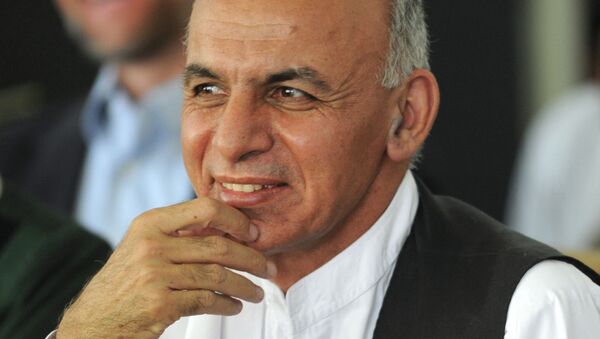MOSCOW, October 29 (RIA Novosti) — Afghanistan’s newly-elected President Ashraf Ghani began his four-day state visit to China on Tuesday, Xinhua reported.
The two countries have publically pledged to a long-term partnership in the years ahead; President Ghani told Chinese President Xi Jinping and Chinese officials in Beijing that Afghanistan considers China “a strategic partner, in the short term, medium term and very long term,” Agence France Press quoted him as saying.
Xi echoed Ghani’s friendly tone, hailing him as “an old friend of the Chinese people,” saying that China would be prepared to work with Afghanaistan towards “a new era of cooperation,” taking relations “to a new depth and breadth.”
The visit is seen by analysts and commentators as an attempt by the Afghani president to strengthen security and economic ties with regional powers as NATO combat forces prepare to withdraw from the war-torn country in December.
The visit has already bore fruit: four new agreements were made Tuesday which expanded commercial and technological ties. President Jinping also pledged $245 million in assistance over the next three years.
Ghani thanked the Chinese government for its “extraordinary act of generosity,” and voiced his hopes that in the future, China’s continued economic rise will also benefit Afghanistan through trade and investment projects.
Ghani’s deputy spokesman Fayeq Wahedi told Businessweek that President Ghani looks “to China as both a neighbor and regional power which can help Afghanistan in all areas of cooperation including in economy, trade and security.”
Security
Last week, Afghanistan asked the Shanghai Cooperation Organization’s member states for assistance in combatting its insurgency.
China, which shares a small, but vital border area with Afghanistan, is fighting its own extremists in the western Xinjiang region. The country has suffered a series of insurgent attacks in recent years, including a deadly attack on a train station in the southwestern city of Kunming in March that claimed the lives of over 30 people. The attackers were suspected separatists from the province of Xinjiang. Chinese state media reported at the time that the terrorists were likely trained in the remote mountain regions of Afghanistan and Pakistan.
President Ghani told his Chinese counterpart that Afghanistan would offer “staunch support…in China’s fight against East Turkistan Islamic Movement terrorist forces,” noted Kong Xuanyou, the Director General of the Chinese Foreign Ministry’s Asian Affairs Department.
China Institute of International Studies expert Shen Shishun told Bloomberg that “Afghanistan…plays an important role in China’s geopolitical considerations,” adding that “a stable Afghanistan will be a natural defense wall against separatism and terrorism spilling over the border.”
Afghan officials have also placed high hopes in Beijing’s influencing neighboring Pakistan to stop their passivity over the porous Afghanistan-Pakistan border, which has long been suspected of giving Taliban militants safe zones in Pakistan.
Economics
China has demonstrated an ever-increasing interest in Afghanistan’s mineral wealth over the years, securing major copper and oil resource contracts with the mineral-rich country. State-owned China Metallurgical Group has already spent $3 billion on a copper mining complex at Mes Aynak outside Kabul, but the project has faced problems due to threats from militants, along with the discovery of ancient artifacts in the mining zone. In 2011, China National Petroleum Corp signed agreements with Afghanistan, hoping to reap about $7 billion in profits from the agreement, Bloomberg notes.
China’s total investments in Afghanistan have amounted to about $7.5 billion over the last decade, and plans exist for further investments as the two nations continue to improve their ties.
Geopolitics
With about 28,000 of NATO’s 40,000 troops in the country set to leave by the end of the year, and most of the rest planning to do so by 2016, the Afghan army and police will be left on their own in dealing with the Taliban insurgency. At the same time, the country faces a decline in Western economic aid commitments, which presently comprise about 60 percent of the country’s budget.
Azhdar Kurtov of the Russian Institute of Strategic Studies told Rossiya Segodnya earlier this month that that lately “the United States is not concealing that it will no longer provide Afghanistan with the level of aid that it has been allocating since 2001,” which means that Afghanistan will “need to look for other sources, because [the country] is not able to stand on its own economic legs.”
Kurtov added that while Afghanistan will be seeking new security guarantors, China will take account of the US experience in the country, and is not likely to take on the role of security sponsor.
In an interview with China’s Global Times newspaper, China Institute of Contemporary International Relations expert Fu Xiaqiang noted that with the withdrawal of NATO forces, “seeking other sources of support is essential to Afghanistan’s stability and development,” adding that “China, as the most capable nation in the neighborhood, has to be its first option.”
Seeking to avoid sending the wrong message to his main security and economic partner, Ghani told US President Barack Obama last month that the continually improving Chinese-Afghan cooperation could serve as “a model for cooperation between China and the United States.”
Khalil Nouri, President of New World Strategies Coalition Inc., told Rossiya Segodnya Tuesday that the US will not give up its strategic position in the country so easily. Nouri said that while "Afghanistan used to be a buffer state" for the US, "it will now be transformed into an 'observation tower'…a perfect strategic location for the United States to monitor nuclear Iran, nuclear Pakistan, Russia and China."




